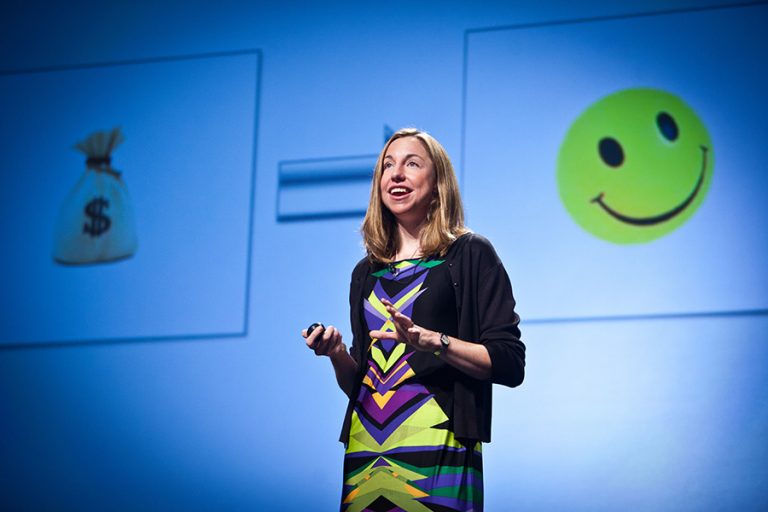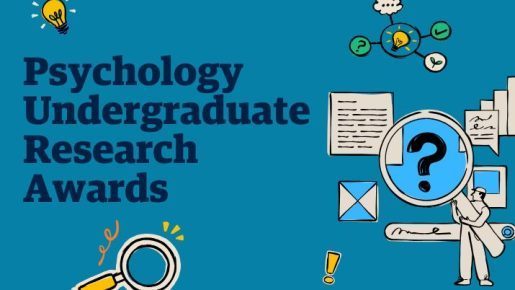

Elizabeth Dunn at Poptech!
Can we live happily ever? Is there an art to being happy? These are just some of the big questions that Professor Elizabeth Dunn answers in our July Lab of the Month feature.
Dunn, co-author of Happy Money: The Science of Smarter Spending, has been exploring the science of happiness for over 15 years. Individuals, employers, governments, and corporations from around the world are taking note of Dunn’s happiness research, especially as it relates to technology and spending decisions.
Her research is featured regularly in The New York Times, The Wall Street Journal, The Economist, The Globe and Mail, and CBC News. She has spoken at PopTech! and TEDx; international conferences that bring innovators together from many different fields including science, technology, design, corporate and civic leadership, public health, social and ecological innovation, and the arts and humanities.
In this Q&A, Dunn shares the research taking place in her Social Cognition & Emotion Lab, the new research she’s excited about, and if there’s an art to being happy.
What’s the lab’s main research focus?
The central interest of our lab is to understand what shapes human happiness. Happiness and human wellbeing is a very broad question to think about – it’s a fundamental question for human existence – and we tackle specific components within that broader question. We focus on the role of social relationships and how social interactions, even trivial ones, can shape happiness. We also study the role technology plays in regards to our wellbeing and how people navigate choices relating to time and money.
When and why did you first develop an interest in understanding happiness?
I was an undergraduate student at Harvard and I was working in Dan Gilbert’s lab, who is the author of Stumbling on Happiness. Working with him made me interested in understanding human happiness. At one point I started to study stereotyping and did some research on that, but I was pulled back to the allure of happiness.
What kinds of questions do you try to answer?
Any questions that shed light on human wellbeing. The questions that excite me tend to be the ones that regular people also care about. I’m not interested in filling the gaps in literature that only scholars care about. I want to know the things that people out in the world are talking about. Everyone is walking around attached to our smartphones – I want to know how they are shaping our social interactions. These are the kinds of questions that people discuss over drinks and surprisingly this topic has received little attention by psychologists. These questions draw me in.
Watch a video highlighting Dr. Dunn’s research:
Is there an art to being happy?
I like to think of it as more of a science but certainly applying any scientific findings to everyday life requires some art. One of the key findings from happiness research is that there is no such thing as “happily ever after”. For example, right now I basically have everything I’ve ever wanted in life – my dream job, awesome husband, adorable child – and I’m still not happy every day. It’s really about, more than we recognize, the way that we navigate choices in our everyday lives; do you make time to bike to work, or accept the fact that you’ll be five minutes late for an interview because your son wants to spend time with you. There is some type of art involved in navigating these choices.
Can you tell us about any new research that you are particularly excited about?
Broadly I’m interested on how the technological revolution that we’re all living through is shaping every facet of our lives, and how technologies affect our social interactions and happiness. I’m very curious about how technology is changing education. I’m fascinated by the idea of Massive Open Online Courses (MOOCs) and why that they haven’t been as successful (depending on the metric) as you would think.
It’s a wonderful and promising idea to harness technology to bring education to a large population of people who might not have access. But the completion rates are extremely low. I’m interested in seeing if we can harness what we know about social interactions and happiness to promote the successful utilization of that technology. For example, maybe one of the things missing is the key ingredient of education: the social component. We have evolved to learn socially. I want to know if there are ways to promote those feelings of social connectedness – that we know are so important – in the MOOC environment.
What are other members of the lab working on?
Ryan Dwyer, a graduate student in the lab, is exploring this idea related to MOOCs and the role of social interactions in promoting online learning. Ashley Whillans, another graduate student, is studying how people make trade-offs between time and money. For this research we’ve collected data from large samples of people all over the world. We’re seeing that people who outsource the tasks that they dread to others (such as housecleaning) tend to be happier. It’s an idea we discussed in my book (Happy Money) but we had limited evidence for it.
Another interesting project we’re working on is with the White House Social and Behavioural Sciences team. We’re exploring the idea of rewarding people with time vs. money and whether that enhances job satisfaction and motivation. For example, we’ll see if employees would prefer four hours of time or fours hours of pay as a bonus or a reward.
Can you describe the personality of the lab?
One thing I’ve learned in my decade as a professor is that individual personalities really matter and I choose graduate students that I like spending time with. Therefore we have a fun, interesting group of people in the lab that I enjoy working with. They are high energy, hard working with a flair for fun.
What does the lab do for fun?
We do a lot of fun activities! Our next team activity is a of game archery tag.
Lastly, are you recruiting participants for any studies and if so, where should people go to sign-up?
The lab is currently exploring how Lower Mainland bridge commutes affect happiness. Specifically, we are interested in drivers who commute using the Pattullo Bridge and how their decisions on the road affect their mood. The findings from this initial survey will be used to design an experiment probing how drivers may find happiness by changing their routes. If you use the Pattullo Bridge and are willing to share your experiences, we have a short survey at bit.ly/ubcbridgestudy.
Another study we are running is called ‘Audio Recordings’. Psychology students can sign-up through the HSP system and will receive one credit for their participation. The study involves just 5-7 minutes per day for one week; each day, participants will be asked to complete a nightly survey, which will involve a short questionnaire, and making two brief audio recordings with their smartphones.
Watch
In this video Elizabeth Dunn reveals some intriguing data: consumers who have friendly interactions with cashiers and baristas report more feelings of everyday happiness and a greater sense of belonging in their communities.


